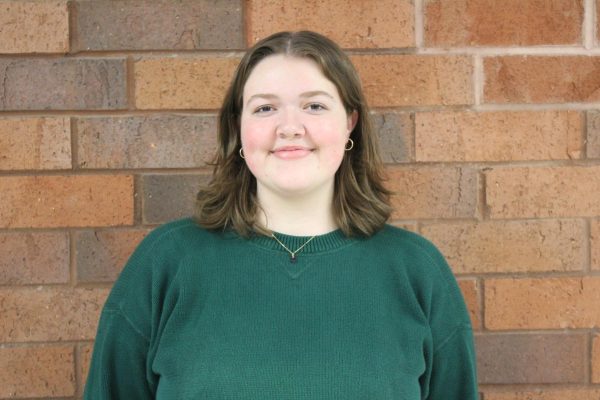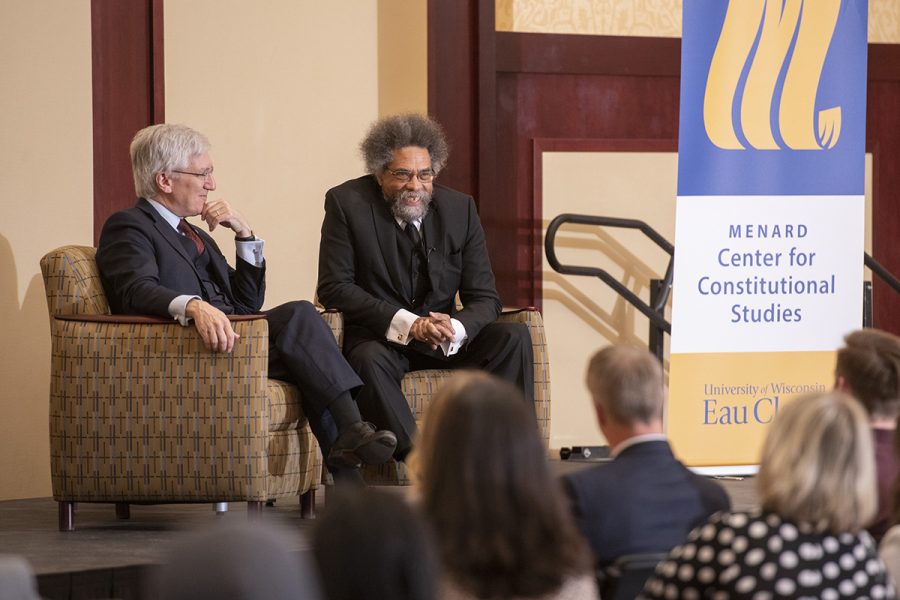Cornel West and Robert George spoke at UW-Eau Claire
The “ideological odd couple” spoke about the freedom of expression and civil discourse on university campuses
The Menard Center for Constitutional Studies hosted an event titled “Freedom of Expression and Civil Discourse with Cornel West and Robert George” on Thursday, May 5 in the Ojibwe Ballroom.
The event was part of the Menard Center’s efforts to “promote research, education and community outreach on matters related to the United States Constitution and the Wisconsin constitution.”
Philip Rechek, the Menard Center program coordinator, said the event was intended to be a celebration for the $3.75 million gift from the Menard Family in 2020, but the event was pushed back because of COVID-19 concerns.
After two years of planning and renegotiating, Rechek said the event went really well, and West and George are fantastic speakers.
West and George have been described as an “ideological odd couple” by many national media outlets.
West is a non-Marxist Socialist and the Dietrich Bonhoeffer Chair at Union Theological Seminary, according to his website. He was a professor of the practice of public philosophy at Harvard University and professor emeritus at Princeton University.
George is a theo-Conservative and the McCormick professor of jurisprudence at Princeton University and the director of the James Madison Program in American Ideals and Institutions, according to his website.
Despite their ideological differences, West and George both believe in the importance of the freedom of speech.
“We can’t be a part of a quest for truth or for goodness without allowing different voices to be heard,” West said. “You can’t censor, you can’t suppress, you can’t repress, you have to allow the voices to be heard so you can then render those voices accountable.”
George said they work to protect speech they disagree with to ensure all speech remains protected.
West said he and George have much more than civility or a citizen’s respect for one another, but rather love.
“Civil is not a strong enough word, I love my brother. It’s a profound love and it’s an unconditional love. Once you have that, then if I think he’s dead wrong I tell him so and we wrestle with it,” West said.
“Our relationship is a special one in the sense everyone is not going to have the deep love and brotherhood that we have,” West said. “Now among citizens, then it’s a matter of respecting each other and caring enough about each other that you allow each one to disagree.”
George said everyone should have a friend they disagree with so they can discuss difficult topics with someone they trust and care about.
“Unless you already have a friend who deeply disagrees with you about matters that you really care about, then go and make one,” George said.
West said finding the courage to express yourself can be difficult and suggested students surround themselves with courageous people.
George said he encourages students, and everyone, to take a mental audit of their most important beliefs and try to figure out why they believe what they do and why reasonable people could disagree.
Hannah Temes, a third-year political science student and Menard Center scholarship recipient, attended the event and dinner beforehand with the guest speakers.
“They have the same base core beliefs, but their conclusions about those beliefs are different,” Temes said. “It was cool to see the difference in what they concluded based off the same information.”
Temes said the freedom of expression is important for students to form their own beliefs without falling victim to an echo chamber of people with the same opinions.
“At college, you are meant to be challenged, you aren’t meant to be coddled or create an echo chamber for yourself. You are here to learn and form your own beliefs, you aren’t here to affirm your beliefs,” Temes said.
Temes said the ability to discuss topics in a civil manner prepares students for having more meaningful conversations in the workplace or interpersonal relationships.
“If we are able to have a civil conversation with one another and actually sit down and have a genuine interest to learn about what another person thinks, then we are able to do a lot more than if we are just talking to one another but not listening to one another,” Temes said.
Temes was seated at the same table as West during the dinner and said she had the opportunity to speak with him.
“It was really nice just being able to sit down and informally talk to him over dinner,” Temes said.
Several university administrators attended the event and dinner.
“I was really happy that a bunch of the university’s leadership team has been there and been to lots of our events,” Rechek said. “It goes a long way of setting a tone for the university.”
Chancellor James Schmidt was one of the administrators in attendance and he said the event was a phenomenal success.
“I have been wanting to be hosting things like this for more than 20 years, long since before I got here,” Schmit said. “I think these ideas of free speech and civil discourse are absolutely core to the university experience.”
Schmidt said he wants UW-Eau Claire to lead universities in prioritizing students’ right to the freedom of speech and encouraging communication when there are disagreements.
“I think we need to step up, I think we lead in these areas and I think we need to be able to demonstrate to the broader public, the community and the state that Blugolds can disagree with one another without being disagreeable,” Schmidt said.
Rechek said there will be more guest speakers in the future, including former American Civil Liberties Union President Nadine Strossen for Constitution day and Political Science Professor Wilford Riley from Kentucky State University for free speech week.
Additional information about the Menard Center can be found on their website.
Kasper can be reached at [email protected].

Maddie Kasper is a third-year journalism and political science student, and this is her fifth semester at The Spectator. She covered the UW-Eau Claire Student Senate for three consecutive semesters while dreaming of being a national political correspondent. She adores poems about oranges and the Half Price Books on the east side of Madison.











